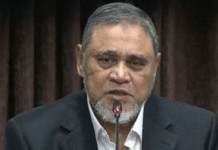
Shahid Islam, the Laxmipur lawmaker now detained in Kuwait, was defended by the Bangladesh ambassador to the Gulf country in a February letter to the foreign ministry following media reports on his alleged criminal activities.
Besides, several Bangladeshi journalists, who worked as Kuwait correspondents for Bangladeshi media, accused the ambassador of protecting the MP.
On June 6, Kuwait’s Criminal Investigation Department arrested Shahid on charges of human trafficking, visa trading, and money laundering.
He has since confessed to bribing millions of dollars to Kuwaiti officials for recruiting Bangladeshi workers and getting contracts for his company.
More information on Shahid alias Kazi Papul, independent MP from Laxmipur-2 and managing director and CEO of Marafie Kuwaitia Group, is surfacing now after the Kuwait Public Prosecution’s interrogation.
Arabic-language newspaper Al-Qabas without naming Shahid reported that a Bangladeshi lawmaker was said to have given five expensive cars as gifts to senior government officials of Kuwait to facilitate his company Marafie Kuwaitia Group getting several government contracts.
After these reports were published in Kuwaiti newspapers, State Minister for Foreign Affairs Shahriar Alam asked the Bangladesh ambassador to investigate the matter.
In the letter dated February 19, a copy of which has been obtained by The Daily Star, Abul Kalam said he summoned the Al-Qabas reporter to the embassy and asked about his sources of information and if he had any specific information about the investigation initiated by the Kuwait’s interior ministry.
“In response, the reporter said he heard it from his sources. I asked him about the name of the MP and two others, but he said he didn’t know the names and did not mention the name of the MP as well,” he wrote in the letter.
Abul Kalam said human trafficking happens when people illegally travel from one country to another and then asked if any such thing happened in this case. In response, the reporter said thousands of Bangladeshis were taken to Kuwait to work for these companies, the letter continued.
The ambassador then told the reporter that recruitment of foreign workers requires lamina (a no objection certificate) and visas and Bangladeshis were recruited following the same procedures. And he asked how this was human trafficking then.
“The reporter failed to give any good answer to this question. This proves that the news report was motivated,” Abul Kalam wrote in the letter.
Kuwaiti authorities ban travel of any foreigner accused in a criminal case and arrest him on entering the country, he told the ministry, but Shahid did not face any such situation during his entry into Kuwait.
“He [Shahid] has been having his normal movement in Kuwait for the last one week and operating his businesses,” the ambassador wrote in the letter.
Kuwait’s General Department of Criminal Evidence issued a “Good Conduct Certificate” while its interior ministry’s Criminal Evidence Department issued a “Not Convicted” certificate to the MP, it continued.
“We also inquired into the matter with Kuwait’s ministries and divisions concerned but got nothing of what was published in Al-Qabas. We sent a rejoinder to the newspaper and asked them not to write anything involving the Bangladeshis without confirmation,” the letter stated.
After Shahid’s arrest last month, Abul Kalam told The Daily Star that he sent a letter to the Kuwait foreign ministry asking for details of why the MP was arrested, but has not yet received a response.
On June 25, State Minister Shahriar Alam told this correspondent, “We have asked whether the ambassador could give us any more updates on Papul’s arrest but there has been no concrete feedback yet.”
JOURNOS BLACKLISTED, DEPORTED
In the last two years, the Kuwait government deported at least two Bangladeshi reporters from the country — allegedly after the Bangladeshi embassy’s complaints to the Kuwaiti CID against them.
Ehsanul Haque Khokon, Jamuna TV correspondent in Kuwait, said he was blacklisted and deported by the Kuwaiti authorities, allegedly after a complaint by the Bangladesh Embassy.
In a complaint to the foreign and expatriates’ welfare ministries, Khokon said he went to the embassy for an interview of Ambassador Abul Kalam on January 17, 2018.
That was the day when around 500 Bangladeshi migrants were there with complaints of non-payment and at one stage, attacked the embassy.
A few days later, he said, Kuwait CID summoned him to its office and detained him, citing a complaint from the Bangladesh embassy.
Khokon was released by CID after three days. He said he called the embassy and wanted to know about the complaint but was told he wouldn’t have any problems.
In September 2018, Khokon came to Bangladesh on leave and flew back to Kuwait on November 27. However, Kuwait CID arrested him at the airport and sent him to jail.
“As I asked for the reason of arrest, CID said it was because of Bangladesh embassy’s complaint. If the embassy wants, I could be released because the Kuwait government had no complaint against me.”
A month later, Kuwait authorities deported him to Bangladesh, Khokon wrote in his complaint to the ministries complaint on March 11 this year.
Banglavision’s Kamrul said he had no complaints from his employer or the Kuwait government but he was arrested by Kuwait CID on October 29 last year, following a complaint by the Bangladesh embassy. He was deported to Bangladesh a month later.
In a complaint to the foreign and expatriates’ welfare ministries on February 19 this year, he said he had been blacklisted from entering the country though he could have worked 10 more years in Kuwait.
“In my experience of working in Kuwait for over two decades, I realised the officials and employees at the Bangladesh Embassy now are more involved in corruption than those in the past,” he said in the complaint.
Kamrul told The Daily Star, “We tried to focus on Bangladeshi migrants’ sufferings and exploitation. That’s the reason we were deported and blacklisted, I guess.”
Asked about the matter, State Minister Shahriar Alam said, “I am not aware of such deportation.”
Ambassador Abul Kalam did not respond to requests for comment on the allegations brought by journalists.
MP THREATENED JOURNOS TOO
Five Bangladeshi journalists based in Kuwait — Kamrul Hasan of Banglavision, Jalal Uddin of RTV, Mahmudur Rahman Mahmud of Ajker Surjoday, Al Amin Rana of Dainik Yad and Sheikh Nizamur Rahman Tipu of Drishti Nandan Sylhet — had written to the Bangladesh Embassy back in 2015, complaining that Shahidul and his cohorts had threatened them at various times.
Shahid once asked Kamrul to do a story naming him as the chairman of the Bangladeshi community in Kuwait, read the letter. When Kamrul replied that this was not possible as the MP was the self-declared chairman of the community, Shahid said he would see how he works in Kuwait.
Jalal Uddin of RTV said he was once asked to attend a programme of Shahid at the Hayat Hotel in Kuwait, but he could not cover the event because of office duties. Following this incident, Shahid’s associate Abdul Mannan threatened him.
“On several occasions, Kazi Papul threatened us with harassment using the Kuwaiti administration,” the journalists said in the letter, sent to the then Bangladesh ambassador on February 18, 2015.









